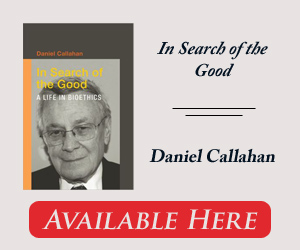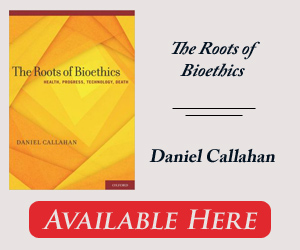In Search of the Good: A Life in Bioethics, By Daniel Callahan, MIT Press, 232 pp., $29
The Roots of Bioethics: Health, Progress, Technology, Death, By Daniel Callahan, Oxford University Press, 256 pp., $55
Daniel Callahan has always held an unusual place in the field of bioethics. Having co-founded the pioneering bioethics think tank the Hastings Center in 1969, Callahan could fairly claim to have invented the field. Over a period of four decades, he has produced a body of intellectual work in bioethics unmatched by any other scholar. Yet Callahan has never really seemed comfortable with his invention. As he writes in The Roots of Bioethics, “A fair number of us who have been in the field for a number of years feel a bit embarrassed to describe ourselves as ‘ethicists’ or ‘bioethicists.’ ”
Callahan acknowledges that for all the centers, conferences, and commissions that have multiplied around it, bioethics has failed to become a first-rank intellectual discipline. But he is too much of a gentleman to venture into the darker reason for this. Many bioethicists have transformed themselves into mouthpieces for the medical-industrial complex. Too often the public face of the field is represented by charlatans, bullies, and cheerleaders for clinical research and new technologies. Callahan has swum fiercely against these currents, which helps account for the respect in which he is held, but as a consequence, he has probably not exercised as much power as his louder colleagues.
Yet at age 82, Callahan remains a formidable intellectual force, having released two new books last year. The Roots of Bioethics is a collection of essays written over the course of his storied career—the earliest in 1973, the most recent in 2012. His later essays feel just as fresh as any of his earlier work, as does his intellectual memoir, In Search of the Good, where his prose crackles with wit and intelligence.

Callahan was drawn to bioethics partly out of frustration with his chosen discipline, philosophy, which he pursued as a doctoral student at Harvard in the 1950s. He found the department there “strange and gradually distasteful.” Only three of the 17 students who began with him finished their degrees; the dropouts included writer Susan Sontag and civil rights leader Robert Parris Moses. As a Catholic, Callahan was a curiosity in the department; as a graduate student interested in ancient questions about how to live, he was an outcast. At Harvard, philosophy was treated as a complex linguistic game, dominated by methods imported from Oxford and Cambridge. “What is the meaning of life?” went an inside joke of the period. The answer: “Life has no meaning; only propositions have meaning.”
As bioethics has grown in influence, most new programs have been set up in medical schools and academic health centers. The rationale is simple: if bioethicists want to study medicine, they need to be close to the action. But it has proven difficult for them to make serious careers in academic medicine’s hierarchical, authoritarian culture. As academic medicine itself has become more subservient to corporate interests, a number of prominent bioethicists have signed on as paid consultants to the pharmaceutical and biotechnology industries. Callahan admits that the Hastings Center has not entirely escaped these entanglements. “On two occasions,” he writes, “the hand that (partly) fed us (Pfizer and Eli Lilly) abruptly withdrew their annual grants when we published articles they found objectionable—and they let us know that was the reason.”
Bioethics has also seen the emergence of a generation of powerbrokers who lack serious scholarly achievement, instead having made their names in high-profile government or policymaking positions. In this sense, many bioethics programs resemble schools of business or public affairs, in which faculty members are appointed for their practical experience. The difference is that these government and policymaking bodies have had little, if any, social or political effect on medicine. Belonging to one yields nothing more than a ceremonial addition to an academic CV.
Today, most bioethics scholarship looks like the work of skilled technocrats: impersonal, mechanical, highly attentive to numbers and data, and devoted to guidelines and procedures. Yet the bioethics movement has always harbored scholars more interested in the deeper cultural and philosophical issues surrounding mortality, identity, and how to live a good life. In this battle between the technocrats and the intellectuals, Callahan has always come down firmly on the side of the latter. He is liberal in his politics, communitarian in his ideology, and insistent that the moral life is not solely a matter of individual rights, freely chosen commitments, and personal ethics. “The claim that so-called private choices should be exempt from moral analysis is the death of ethics,” he writes.
 Callahan is skeptical about new medical technologies, especially those used to prolong life in the elderly. He cautions against the view that technologies themselves are neutral instruments to be used only in ways we choose. “Most new technologies are introduced not as enslaving tyrants,” he writes, “but as choice-increasing, society-enhancing developments that we are free to take or leave.” Yet those technologies often become so embedded in ordinary life that they seize control. The tyranny of medical technology will be familiar to anyone who has spent time in an intensive-care unit, where physicians appear bewitched by glowing numbers on complex machines, or even to patients trying to relate their medical history to a doctor staring at a computer screen. That this phenomenon should be prevalent in the medical profession should not surprise us. Most Americans respond to the beeps and chimes from their smart phones and tablets as robotically as Raymond Shaw responds to the Queen of Diamonds in The Manchurian Candidate.
Callahan is skeptical about new medical technologies, especially those used to prolong life in the elderly. He cautions against the view that technologies themselves are neutral instruments to be used only in ways we choose. “Most new technologies are introduced not as enslaving tyrants,” he writes, “but as choice-increasing, society-enhancing developments that we are free to take or leave.” Yet those technologies often become so embedded in ordinary life that they seize control. The tyranny of medical technology will be familiar to anyone who has spent time in an intensive-care unit, where physicians appear bewitched by glowing numbers on complex machines, or even to patients trying to relate their medical history to a doctor staring at a computer screen. That this phenomenon should be prevalent in the medical profession should not surprise us. Most Americans respond to the beeps and chimes from their smart phones and tablets as robotically as Raymond Shaw responds to the Queen of Diamonds in The Manchurian Candidate.
Callahan regrets what universities have done to bioethics—quietly encouraging risk aversion among its practitioners, who all too often are more concerned with pleasing their colleagues and avoiding mistakes than moving the field forward. Whether their conformity is due to their location in universities is a matter for debate, but few people would accuse Callahan of shying away from risks. For that, we should all be grateful.

